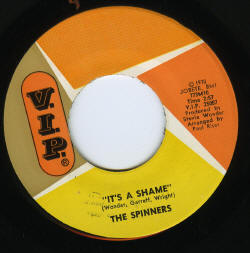This article needs additional citations for verification .(October 2016) |
| "It's a Shame" | ||||
|---|---|---|---|---|
 | ||||
| Single by the Spinners | ||||
| from the album 2nd Time Around | ||||
| B-side | "Together We Can Make Such Sweet Music" (1st ver.) | |||
| Released | June 11, 1970 | |||
| Recorded | 1969–1970 | |||
| Studio | Golden World (Studio B) (Detroit, Michigan) | |||
| Genre | Soul | |||
| Length | 3:12 | |||
| Label | V.I.P. V-25057 | |||
| Songwriter(s) | ||||
| Producer(s) | Stevie Wonder | |||
| The Spinners singles chronology | ||||
| ||||
| Official audio | ||||
| "It's a Shame" on YouTube | ||||
"It's a Shame" is a song co-written by Stevie Wonder, Syreeta Wright and Lee Garrett and produced by Wonder as a single for the Spinners on Motown's V.I.P. Records label. The single became the Detroit-reared group's biggest single on the Motown Records company since they had signed with the company in 1964 and also their biggest hit in a decade.
Contents
The lineup of the Spinners include original members Pervis Jackson, Henry Fambrough, Billy Henderson and Bobby Smith and lead vocalist G. C. Cameron. The quintet recorded the single in 1970.
The song, which is about a man who complains about a lover's "messin' around" on him, became a huge hit for the group peaking at number fourteen on the Billboard Hot 100 the week of October 17, 1970 and number three on the R&B singles chart, [1] making it one of their biggest hits to date. The song was the first song Wonder produced for another act by himself.
Beverly Dewitt Yancey, the father of hip-hop producer J Dilla, claims to have ghostwritten the song and sold it to Motown, but the song’s attributed writers dispute this. [2]